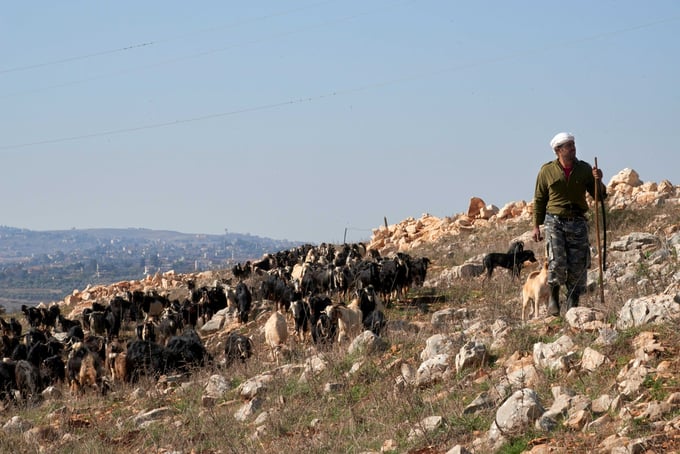November 28, 2025 | 05:01 GMT +7
November 28, 2025 | 05:01 GMT +7
Hotline: 0913.378.918
November 28, 2025 | 05:01 GMT +7
Hotline: 0913.378.918

Thirty percent of population in Lebanon faces acute food insecurity as 2025 begins, malnutrition risk remains.
Nearly a third of Lebanon’s population is facing acute food insecurity following the escalation of conflict in late 2024 and recovery from the impact of hostilities on agriculture and the economy is likely to be slow, according to a new food security assessment.
The Integrated Food Security Phase Classification (IPC) analysis on Lebanon, developed by FAO, WFP and the Ministry of Agriculture, shows that some 1.65 million people in Lebanon are now facing crisis or emergency levels of food insecurity (IPC phase 3 or above), up from 1.26 million before the escalation. Meanwhile, 201,000 people are grappling with emergency levels (IPC phase 4), twice the number before.
"Lebanon’s worsening food security is no surprise," said Matthew Hollingworth, WFP Representative in Lebanon. "Sixty-six days of war, preceded by months of conflict, have shattered lives and livelihoods. While some can return home after the ceasefire, others face the harsh reality of having no home left to return to. At this critical moment, our mission is clear: to support the Government and the people in rebuilding their lives and food systems”.
The report projects that food insecurity is expected to persist over the next three months, with no short-term return to pre-crisis conditions. With challenges ahead, ongoing humanitarian efforts in supporting recovery will be critical."The escalation of hostilities has severely impacted farmers' livelihoods, as well as agricultural assets and infrastructure, leading to heightened food insecurity and threatening the sustainability of farming activities," said Veronica Quattrola, FAO Representative in Lebanon a.i. She added, "FAO is steadfast in its commitment to helping farmers resume production and supporting communities in rebuilding and enhancing their resilience."
Lebanon’s refugee populations are particularly at risk, the report noted. Some 594,000 Syrian refugees (40 percent of the Syrian refugee population) and 89,000 Palestine refugees (40 percent of the Palestinian refugee population) are classified as facing IPC Phase 3 (Crisis) or above. Some 970,000 Lebanese residents (25 percent of the population) are in the same bracket.
The conflict has severely disrupted economic activity and livelihoods across all sectors, the report said, noting that markets were still struggling to get back on their feet despite the November ceasefire. The sharp downturn deepens what was already a protracted economic crisis. The Lebanese economy has contracted by 34 percent in real GDP since 2019, with investments stagnating.
Malnutrition continues to pose a significant risk in Lebanon, particularly among children, adolescents, and women. A recent study revealed that three in four children under the age of five are eating diets with very little diversity, leaving them vulnerable to stunting and wasting.
In 2024, WFP provided food assistance to 750,000 people displaced by fighting, supplying hot meals, food supplies and cash assistance to people in shelters and communities across Lebanon. This year it plans to assist 2.5 million people, including almost 900,000 Syrian refugees in Lebanon.
The caretaker Minister of Agriculture, Dr. Abbas Al-Hajj Hassan, emphasized the importance of sustainability, transparency, and trust in agricultural projects, highlighting the meeting as a result of extensive efforts and strong partnerships among stakeholders. He stated: "These partnerships strengthen our nation, which needs support from international bodies and local partners. Sustained cooperation is key to achieving sustainable development for Lebanon's agricultural sector." Dr. Al-Hajj Hassan underscored the national significance of assessing damages caused by the Israel war with Lebanon, noting: "This process began on day one of this war, resulting in joint technical committees with international organizations and local partners, enabling effective assessments”. He affirmed the project’s goal of compensating affected farmers: "Our priority is securing funding for damages, and we will work tirelessly to achieve this." He concluded by reaffirming the ministry's commitment to sustainable agricultural development and collaboration with all partners to address Lebanon’s challenges.
Prior to the intensification of the conflict, 23 percent of the population (Lebanese, Syrian, and Palestine refugees) was already classified as IPC Phase 3 or above (April–September 2024), totalling 1.26 million acutely food insecure.
(FAO)

(VAN) On November 27, in the meeting with Minister Tran Duc Thang, Mayor Yin Yong shared Beijing’s experience to improve environment and air quality.

(VAN) After 30 years, both sides identified strategic areas of cooperation: sustainable production, increasing coffee value and training for farmers.
/2025/11/27/4910-4-164708_294.jpg)
(VAN) On the afternoon of November 27 in Beijing, Minister of Agriculture and Environment Tran Duc Thang held a working session with several major Chinese enterprises operating in the agriculture and environment sector.

(VAN) The Department of Animal Health issued a provisional guideline requesting local authorities to increase surveillance, collect samples for testing, and conduct epidemiological investigations according to the established procedure.

(VAN) The United Nations recommends that Vietnam utilize data and artificial intelligence to enhance early disaster warnings and reduce GDP losses by 3.2% in the context of climate change.

(VAN) On the morning of November 27 in Beijing, Minister Tran Duc Thang and the Deputy Commissioner General of the General Administration of Customs of China signed a protocol on fresh jackfruit exports.

(VAN) As floodwaters recede, a vast network of irrigation works across eastern Gia Lai is emerging in a state of severe disrepair, with extensive damage demanding urgent restoration ahead of the 2025-2026 winter-spring cropping season.